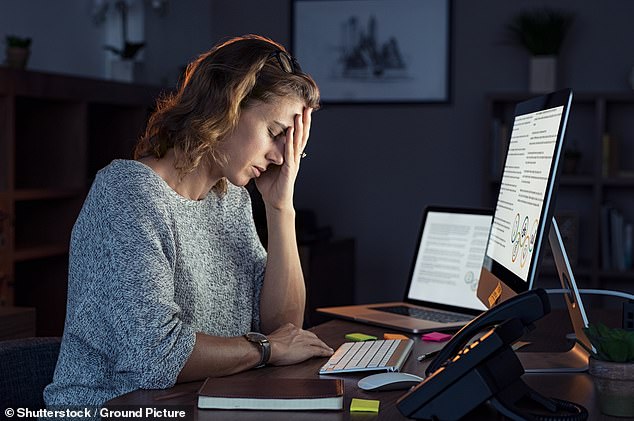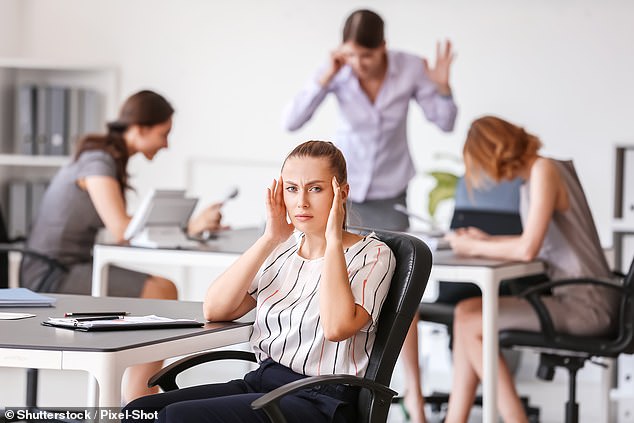It Gives Me a Headache! Pharmacist Reveals the 5 Different Types of Headaches—and How to Treat Them
Headaches seem to strike at the most inconvenient times, often when you need to be optimally concentrated and focused on a task.
Once you have a headache, it seems like you can’t get rid of it. The headache keeps gnawing and grinding, while in fact you are just suffering and silently wishing and praying for the headache to go away.
Luckily for those looking for a quick fix, a pharmacist has revealed the five different types of headaches and how to treat them.
George Sandhu, Assistant Pharmacist at Well Pharmacy, talks about the most common headaches and how to relieve them.
Read below to find out what headaches you might have and how you can effectively relieve them and prevent your head from pounding.
George Sandhu, deputy pharmacy director at Well Pharmacy, the UK’s largest independent pharmacist, has shared the most common headaches and how to make them go away (file image)
Tension headache
Mr. Sandhu first addressed tension headaches, which he said are common and often caused by stress, sleep problems and caffeine.
According to him, symptoms include pain on both sides of the head, face or neck and a feeling that something is pressing or tight on the head. The affected areas may also be tender and the head may hurt more when you touch it.
To treat tension headaches, George recommends over-the-counter pain relievers such as ibuprofen or paracetamol.
According to the pharmacist, staff can also advise customers to maintain good posture, manage stress through relaxation techniques, take regular breaks from working at a screen and ensure they drink plenty of fluids.
Migraine
Next, Mr. Sandhu spoke about migraine. According to him, migraine usually feels like a severe headache with a throbbing pain on one side.
The pharmacist warned that the symptoms are generally more severe than a regular headache and that there are two types of migraine: with and without aura.
Aura is a term used for sensory or visual disturbances, which are symptoms of headache. Examples include seeing flashes of light, blind spots, numbness or tingling, difficulty speaking, followed by a headache with throbbing pain.
He said the symptoms should not last longer than an hour.
For migraine with aura, the pharmacy staff may recommend over-the-counter pain relievers and anti-nausea medications if needed. However, some patients may need to be referred to their primary care physician if they require prescription medications.

To treat tension headaches, George recommends treatments such as over-the-counter pain relievers like ibuprofen or acetaminophen (file image)
Pharmacists may also advise clients to keep a migraine diary so they can identify and avoid migraine triggers. For some people, this may include certain foods.
Migraine without aura is similar to migraine with aura and is often triggered by stress, hormonal changes, and certain foods or drinks.
Symptoms include moderate to severe headache on one side of the head, sensitivity to light, sound and odors, nausea or vomiting.
Similar to migraine with aura, the recommended treatments are over-the-counter pain relievers and anti-nausea medications.
Pharmacy staff can advise clients to sleep and eat regularly, drink enough fluids, and avoid known triggers.
Cluster headache
Cluster headache is a severe attack of pain that can last for a long time.
These are severe headaches that can occur several times a day and can last for weeks or months.
The main symptoms are a sharp, intense burning or stabbing pain, usually around one eye, and may cause watering of the eye. You may also feel sick, and they can start and stop quickly and last between 15 minutes and three hours.
The exact cause of this is unknown. They are more common in men between the ages of 30 and 40, or if other people in the family have been affected.
Some patients can identify triggers such as smoking, alcohol use, perfume and other strong odors.
If a patient suspects that he/she has cluster headaches and painkillers such as paracetamol or ibuprofen do not help, he/she should be referred to the GP.
There is no cure for cluster headaches, but a specialist can recommend a number of treatments to relieve and prevent symptoms.
Sinus headache
Finally, George shared how to treat sinus headaches, which are caused by swelling of the sinuses, usually due to an infection.

Cluster headache is a severe attack of pain that can last for a long time (File image)
According to him, symptoms include pain, swelling and tenderness around the cheeks, eyes or forehead.
You may also experience a stuffy nose, a reduced sense of smell or sense of smell, green or yellow mucus discharge from your nose, and a high fever.
Over-the-counter treatments include decongestants, saline nasal sprays, antihistamines if symptoms are caused by an allergy, and over-the-counter pain relievers.
Pharmacy staff may also advise customers to drink plenty of fluids and apply warm compresses to the affected area.
